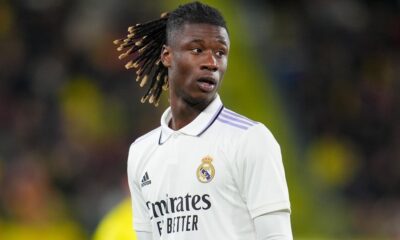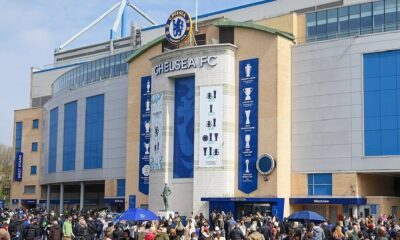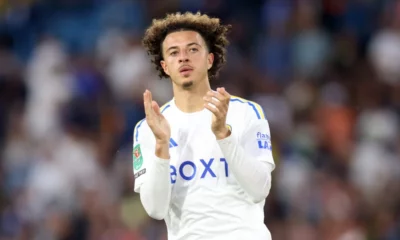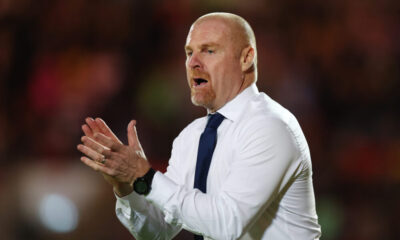Other Football News
Brian Clough: that fantastic manager we all miss
Nowadays, we all hear stories about the Mourinhos and the Guardiolas and their achievements. We even hail them as the greatest managers in history. Yet, in our discussions / debates / dialogues, we forget those legendary names that are cemented in football’s Hall of Fame.
Today, I will be referring to the colourful but talented manager Brian Clough. He is still one of the all-time greats, throughout the world. This is the manager that helped two Second Division clubs win the Division One title (nowadays the Premier League title) and led them to European glory.
“He had fantastic charisma, unbelievable charisma. Outwardly he had this fantastic self-belief and self-confidence” said Martin O’Neill, a key member of that Nottingham Forest side that won two consecutive European Cups.
Clough began his playing career at Bilingham Synthonia between 1953 and 1955. In 1955, young Clough transferred to Middlesbrough where he enjoyed a successful spell, scoring 197 goals in 213 league games. In 1961, Clough transferred to Sunderland where he would score a whopping 54 goals in 61 league games. On Boxing Day, 1962, Clough suffered a cruciate ligament injury in a game against Bury. Despite returning two years later, he retired and joined the club’s coaching staff at only 29. As a player, he played twice for the England national team without scoring.
He became a manager of Hatlepools United (nowadays known as Hartlepool United), becoming the youngest manager in the league. After his successful season with the Hartlepools (earning promotion), Clough was offered the chance of taking over at Derby County. Before Clough’s arrival, Derby had been playing in the Second Division for a decade. His first season with Derby was anything but successful, as club finished one place lower than the previous one.
In the summer he would sack everybody at the club: 11 players, the club’s secretary, the chief scout and even two ladies that were laughing after a team’s defeat. Clough signed several players like Alan Durban, Colin Boulton which helped Derby win the Division Two title. Derby went undefeated for 22 games.
Famous for insisting on being called “Mr. Clough”, the talented manager helped Derby promote to the First Division in 1969. Derby finished fourth in the first season back in the top flight, but, due to financial irregularities, was banned from Europe the following season.
During the 1971-1972, Derby fought for the title with Liverpool, Leeds and Manchester City. Derby won their final game, 1-0 against rivals Liverpool and went on holiday to Mallorca, only to find that their title rivals failed to win their final games. Derby became champions for the first time in the 88-year history.
In April 1972, Clough resigned for a few house to manage Coventry, but reconsidered his decision after a discussion with Derby’s chairman.
In the summer of 1972, Clough refused to travel to the Netherlands and West Germany on an pre-season tour unless he could be joined by his family. He fought with Derby chairman and refused to go. He also signed expensive player David Nish, for a record transfer fee of £225,000 without consulting to the Board of Directors. He was warned by the club’s director Kirkland for his behavior. After a 2-1 win over Liverpool, Clough attacked both the fans and the club’s board of directors. Chairman Sam Longson apologized immediately to the fans, distancing himself from Clough’s acid words.
It was a rather successful season for Derby, as they reached the semi-finals of the European Cup, only to be knocked out by Juventus. The defeat was shadowed by controversy as there were rumors that the referee had accepted “gifts” from Juventus. Clough accused the Italian giants as “cheating bastards” and also questioned the Italian courage during the Second World War.
Remember that a few years earlier, Derby were playing in the Second Division. Fantastic!
In the summer of 1973, Clough traveled to London to buy both Bobby Moore and Trevor Brooking from West Ham, without informing his chairman (Longson) or the other Derby board members. The chairman found out about the unsuccessful bids four months later.
As a result, in October, Longson tried to persuade the Board of Directors to sack the talented manager, but failed. A week before, the chairman demanded that his manager stop writing newspapers articles and making TV appearances.
On 15 October 1973, Clough and his sidekick Peter Taylor (his assistant manager) resigned to put the fans’ pressure on the Board of Directors. The fans quickly demanded the board’s resignation and Clough’s and Taylor’s reinstatement. Clough even appeared on a TV show and criticized chairmans and directors for their apparent lack of knowledge about the beautiful game.
Both Clough and Taylor joined Division Three side Brighton and Hove Albion. From the semi-final of the European Cup to England’s Division Three games in only 8 months, it’s a stretch, even for the fantastic manager. Albion finished on 19th that season.
In July 1974, Clough was appointed manager of Leeds United, in one of the most shocking moves, given Clough’s past outbursts regarding the club (which he accused as playing an overly aggressive and illegal style of football). Clough was not joined by Taylor.
He managed the team for only 44 days, as he was sacked for disputes with the team’s star players. Legend has it that during one of the first training sessions, he said to the players: “You can all throw your medals in the bin because they were not won fairly.”
His short spell with Leeds was adapted into a novel “The damned Utd.” and also into the 2009 movie. In January 1975, Clough was appointed manager of Nottingham Forest, placed 13th in Division Two and was joined by his former assistant Peter Taylor in July 1976.
During the 1976-1977, Nottingham promoted to Division One and in the following season, Nottingham won the League Cup (beating Liverpool in the final) and the Division One title, seven points clear of Liverpool.
He became the first manager since Herbert Chapman to win the Division One with two different clubs.
A year later, Nottingham won the European Cup, beating Malmo 1-0 in the final. Ironically, they had previously defeated two-time European champions Liverppol in the first round of the competition. They finished runners-up to Liverpool in the league and retained the League Cup.
The next season, Nottingham would win a second successive European Cup, thanks to a 1-0 win over Hamburg. Nottingham Forest became the only side to win the European Cup more times than their domestic top flight league.
To win the Champions League is special, I agree. To win it twice with a former mediocre Division Two team is out of this world. It is perhaps the biggest achievement in the history of the reputed trophy.
Look at his career path: from Division Two, to the semi-final of the European Cup, to Division Three, to a 44-day spell with Leeds, to Division Two again, to winner of the European Cup. Twice!
Just take a look at the past winners of the trophy: Di Stefano’s and Puskas’ Real Madrid, Augusto’s and Eusebio’s Benfica, Altafini’s, Maldini’s, Trapattoni’s and Rivera’s Ac Milan, Herrera’s Internazionale, Best’ United, Michel’s and Cruyff’s formidable Ajax, Beckenbauer’s and Muller’s Bayern, Bob Paisley’s and Keegan’s Liverpool. And Nottingham Forest. Brilliant!
Definitely, Clough was one of the best managers in the game, if not the best. Add to all that has been said, a Uefa Cup semi-final in 1984 against Anderlecht. He declared that:
“It was a crooked match and he was a crooked referee. That was a tournament we could and should have won.”
Clough’s man management was unbelievable. For example, Kenny Burns was only a inconsistent playboy before Clough. Under Clough’s guidance, the player became Footballer of the Year. John Robertson was just a talented player before Clough. With Clough’s help, he became one of the deadliest wingers in England. Robertson scored Nottingham’s only goal in the final against Hamburg.
Clough’s words about the player are priceless:
“John Robertson was a very unattractive young man. If, one day, I was feeling a bit off colour, I would sit next to him. I was bloody Errol Flynn to him, but give him a yard of grass and he was an artist. The Picasso of our game.”
The same John Robertson that deteriorated Clough’s relationship with his friend and long-time assistant Taylor. Taylor retired in May 1982 but a few months later became the manager of Derby and signed Robertson without informing Clough. The dispute was settled in court.
Clough also made referrences to Forest’s Brian Rice “I’m not saying he’s pale and thin, but the maid in our hotel room pulled back the sheets and remade the bed without realising he was still in it.”
What about John McGovern? Started his career at Hartlepool with Clough and became the captain of Forest that won the two consecutive European Cups.
Despite being famous for winning the European Cup twice, Clough would often say that his biggest achievement was his team’s unbeaten run for 42 league games between 26 November 1977 and 9 December 1978.
He resigned as manager of Forest in May 1993, as the team didn’t avoid relegation after 16 years in the top flight. Clough was made an inaugural inductee of the English Football Hall of Fame in 2002 in recognition of his huge impact as a manager.
In 2003, the 67-year-old Clough underwent a liver transplant; doctors said that Clough would have died within two weeks without a transplant, as his liver was severely damaged by 30 years of heavy drinking and cancer had been found in it. He died of stomach cancer on 20 September 2004, at the age of 69. A sad day for football!
The flamboyant manager is regarded as he greatest English manager never to have managed the England team. He declared that:
“I’m sure the England selectors thought if they took me on and gave me the job, I’d want to run the show. They were shrewd because that’s exactly what I would have done“
Here are some of his famous quotes (thanks to brianclough.com):
“Manchester United in Brazil? I hope they all get bloody diarrhea.” – referring to United’s to withdraw from the FA Cup to play in the World Club Championship
“I can’t even spell spaghetti never mind talk Italian. How could I tell an Italian to get the ball – he might grab mine.” – regarding the influx of foreign players.
“Rome wasn’t built in a day. But I wasn’t on that particular job.” – on getting things done.
“I only ever hit Roy the once. He got up so I couldn’t have hit him very hard.” – on dealing with Roy Keane.
“We talk about it for twenty minutes and then we decide I was right.” – on dealing with a player who disagrees.
Mourinho’s on and off the field antics are nothing compared to Clough’s. Looking back at his success, Clough declared:
“I wouldn’t say I was the best manager in the business. But I was in the top one.”
He certainly was. I’d challenge all talented managers of modern football to try and emulate him. Take the reins at Crystal Palace, Cardiff or Ipswich Town and conquer Europe. He almost succeeded with Derby and succeeded twice with Nottingham Forest. Brilliant, simply brilliant!






















